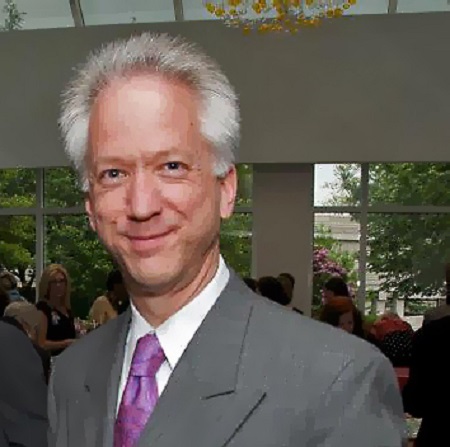NE alumnus establishes endowment for grad students
 Thanks to alumnus Sean Barnett (BSNE ’85), future graduate students in Purdue’s School of Nuclear Engineering will have an added source of financial support.
Thanks to alumnus Sean Barnett (BSNE ’85), future graduate students in Purdue’s School of Nuclear Engineering will have an added source of financial support.
Barnett recently made a deferred estate gift to establish an endowment, named the Dr. D. Sean Barnett Fund for Nuclear Engineering. The fund’s primary purpose is to provide support to academically qualified graduate students with preference given to candidates who intend to pursue a career in the public sector (federal, state, local, civilian or military).
He was inspired to designate the gift after learning that there was a particular need for graduate student funding. “I want to provide opportunities for other deserving students to be able to obtain the high quality education at Purdue that I did,” Barnett said.
In addition, priority will be placed on candidates who participate in Purdue Bands & Orchestras.
“I was a musician in the marching and concert bands while at Purdue, and I thought it would be nice to help students who brought music to Purdue that everyone on campus seemed to enjoy when I was a student.”
He holds Purdue and the School of Nuclear Engineering in high regard, providing “a high-quality education in an area – nuclear science and engineering – that is important to the well-being of our society.”
He credits Purdue for providing the foundation that enabled him to go forward and pursue other educational and career endeavors. Barnett earned a PhD in nuclear engineering from MIT and a juris doctor degree from Georgetown University. He also cites Nuclear Engineering Professor Chan Choi as a great influence while he was an undergraduate.
“He taught the fusion engineering course that inspired me to study fusion in graduate school, and he actually encouraged me to attend MIT when I had the opportunity to do so. He was always very encouraging to me, which I appreciate very much. He helped me follow an academic and career path that ultimately worked out very well for me.”
Barnett has enjoyed a fulfilling career with 30 years of experience in the fields of defense analysis, nuclear engineering, national security, energy and law. He currently is a senior engineer at the RAND Corporation, where most of his work has supported the U.S. Army and has involved military operational assessments, modernization and force structure requirements, and force management issues.
“I have recently analyzed potential major conflicts with Russia, North Korea and China. I have worked on North Korean nuclear weapon developments, Army artillery and aviation requirements, theater-level combat modeling, and the Army personnel screening system,” Barnett said.
For several years, he has been engaged in wargaming both professionally and personally. He leads and supports RAND’s wargame development efforts across multiple theaters and potential conflicts.
“I’m passionate about my work – helping the Defense and Homeland Security departments plan to protect against the threats that our nation faces. I’m passionate about my hobbies of military history and wargaming. Our military history has been important to our nation. It can have implications for policy even today, and wargaming is a way to make history come to life in a competitive and stimulating but also fun way.”
His love of history and travel led him to Normandy, France, in 2019 for the 75th anniversary of D-Day. He has written short books about wargaming scenarios centered around the World War II battles of Villers-Bocage and Operation Epsom.
Before transitioning to RAND, he worked for the Institute for Defense Analyses (IDA) from 1989 to 1997, and then from 2005 to 2015. Between stints at IDA, he practiced administrative law at the firm of Pillsbury Winthrop Shaw Pittman, where he focused on nuclear energy regulation and facility licensing matters before the Nuclear Regulatory Commission and the federal courts.
“What I’m most proud of over the course of my career has been my ability to perform insightful analyses and solve problems related to U.S. national security for the Departments of Defense, Homeland Security, and Energy,” Barnett said. “In doing that, I’ve been able to apply my natural skills and my education – including the education I received at Purdue – to the benefit of all Americans and our friends and allies in the world.
“Our country has faced – and likely will again face – significant threats that could potentially cause us great harm if not mitigated,” Barnett added. “The collective efforts of everyone who works to defend our national security serve to reduce those threats and help enable all of us to pursue our lives as safely as we can.”
He also is committed to finding ways “to bridge the issues that seem to be dividing the American people and causing so much pain these days.”
Whenever he talks about Purdue, he fondly remembers his experience.
“A Big Ten school is a great place to go to college, a great place to meet people of all backgrounds and make great friends,” he said. “Nuclear Engineering provided me a great education, and it educates students to work in an important science and engineering discipline.”
Barnett, who grew up in Carmel, Ind., resides in Annandale, Va.
